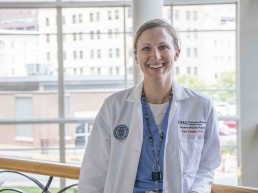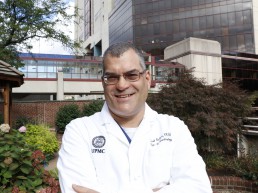Our clinical research coordinators (CRCs) have a unique set of skills. Read on to learn the keys to success as a CRC at UPMC and to learn how you might fit into oncological clinical research!
Compassion
At the top of the priority list, compassion is a non-negotiable characteristic in the field of clinical research. Particularly in the oncology realm, exhibiting the UPMC core value Caring & Listening is absolutely essential! CRC Amanda McFadden exemplifies the importance of compassion, saying, “What if it were me? I would want someone to go the extra mile, to do that one extra thing to help me!” Being able to picture yourself in your patients’ shoes and understanding their view points, wishes, and concerns is all part of practicing medicine with compassion.
Flexibility
CRCs take on an enormous amount of responsibility when consenting patients for new clinical trials. Maintaining a flexible attitude with both patients and co-workers is key to handling the variability associated with cancer treatment. Additionally, this flexible mindset provides balance and perspective when undertaking the numerous tasks for which CRCs are held accountable. Proactively preparing to be flexible and adapt to change helps mitigate chaos when things don’t go as planned.
Organization
Juggling the aforementioned responsibilities requires extensive organizational skills! CRC supervisor Summer Drummond says that this career path is rewarding for many reasons, including “flexible hours, no holidays or weekend shifts, a large department with significant career growth opportunities, and close collaboration with physicians and medical personnel who hold CRCs’ opinions and capabilities in high regard.” Supportive management and flexible scheduling are two benefits which allow CRCs to maintain work-life balance amidst the hectic demands of high-volume patient loads.
That said, with great benefits come great responsibility to efficiently and effectively accomplish tasks while on the clock. CRC Jamie Jackson comments, “You must be able to multi-task, work at a fast pace under pressure, and handle stress well!” Remaining ahead of the curve by taking advantage of UPMC’s instrumental educational opportunities, as well as relying on co-workers for assistance, keeps the CRC team functioning at full-capacity.
Self-Motivation
Though a career in clinical research can be stressful, it is overwhelmingly rewarding and worthwhile. Every clinical research coordinator develops self-motivation for a different reason! CRC Krystle Eaton loves her work, saying, “I enjoy the intellectual aspect and critical thinking of research, my patients, and all of the amazing things we are doing in cancer research to help patients fight and win against their diseases!”
Drummond is highly motivated, explaining that her work “provides hope to oncology patients who have exhausted all standard treatment possibilities,” and further shares, “I often have a hard time making myself go home, as I enjoy every part of my fast-paced, highly independent, ‘wear many hats’ nursing position.”
McFadden, motivated by seeing her patients improve, recalls one particularly rewarding experience: “One of my very young patients with metastatic melanoma had a partial response to treatment on two separate scans — it was amazing! I still remember his mother’s face when we told them the news!” Acknowledging success, seeking to understand the bigger picture, and setting future goals are all excellent ways to maintain self-motivation.
If these characteristics sound like you, we encourage you to explore our clinical research openings at UPMC!




